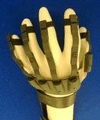October
Print your own

Newcastle University leads the way in the use of 3D printing for medical devices.
Newcastle University is part of a major new exhibition exploring how 3D printing is revolutionising medicine and industry.Using the new 3D printing technology, the University team together with industry leader Peacocks Medical Group are 'printing' tailor-made medical devices that meet the specific needs of each individual patient.
Newcastle is a leading centre for medical engineering, and has worked with Peacocks Medical Group to transform the manufacture of orthotics - the general term for devices worn outside the body to provide support and re-alignment of bones and muscle.
Now some of these devices - including wrist and leg braces, and foot supports - are being displayed as part of a new exhibition which opens today at the Science Museum in London.
Charting the rapidly evolving field of 3D printing and its growing impact on society, 3D: printing the future takes visitors on a journey through the three key sectors in which the technology is driving innovation - industry, medicine and business.
Professor Kenny Dalgarno, who leads the Newcastle University research, explains: "3D printing has allowed engineers and designers to manufacture things that wouldn't have been possible with traditional methods.
"The technology allows us to provide personal healthcare in a way that we could never have imagined before, with every medical device or tissue implant created specifically for the patient in a way that is not only timely but also cost-effective. Through collaborative work with industry partners we’re showing the huge potential for this technology."
The pioneering work in 3D printed orthotics in the North East is the result of a long-standing collaboration between the University and Newcastle-based medical devices company Peacocks Medical Group. Founded in 1903, the family-run business has gone from strength to strength and now Peacocks is a leader in the provision of orthotic services to the NHS, employing over 160 people.
Commercial Director Steve Cook, a former researcher in the School of Mechanical and Systems Engineering at Newcastle University, said: "The close relationship with Newcastle University has been really valuable in helping Peacocks to develop our products and services over the years.
“The variety and scale of the collaborations has been really exciting - it is a real privilege to be working with such enthusiastic and knowledgeable experts in different disciplines.”
The University team are now taking 3D printing to the next level - designing systems that support the body not from the outside, but from within. Newcastle University is part of the Centre for Innovation Manufacturing in Medical Devices (MeDe Innovation) which brings together academics, clinicians and industrialists and aims to revolutionise the way joint replacements and other medical implants are made.
Professor Dalgarno, who is also Deputy Director of the new MeDe Innovation Centre, explains: "All our research on implantable devices is focussed around helping the body's natural repair mechanism to do more, by developing biological implants which support or stimulate the body's own repair processes.
Over time the body replaces the implant with a new tissue or organ. So, for example, we could use 3D printing to replicate tissue structures and stimulate the body of a patient with rheumatoid arthritis to replace damaged joint tissue."
3D: printing the future is free and will run in the Antenna gallery at the Science Museum for nine months from 9 October 2013. It is supported by the Engineering and Physical Sciences Research Council.
published on: 9 October 2013
